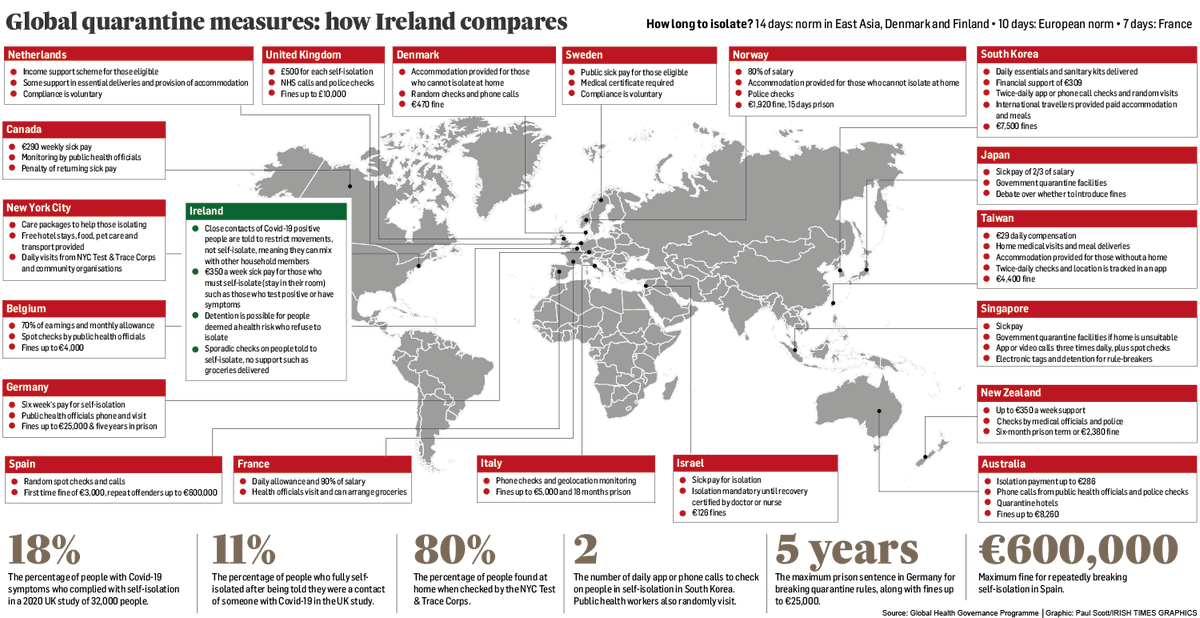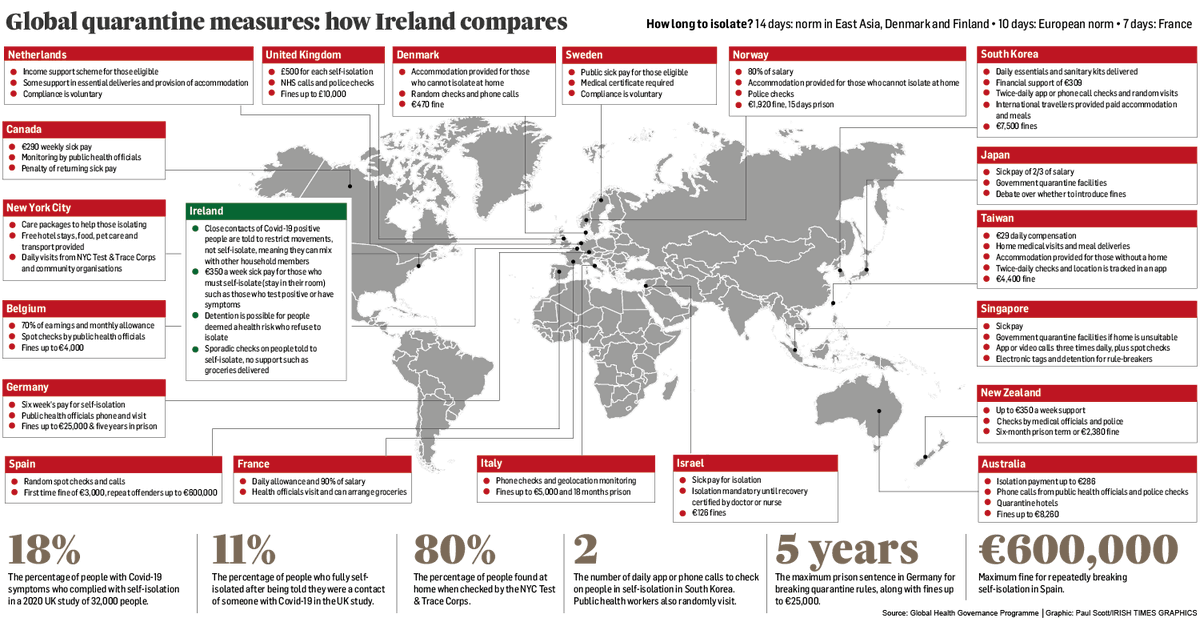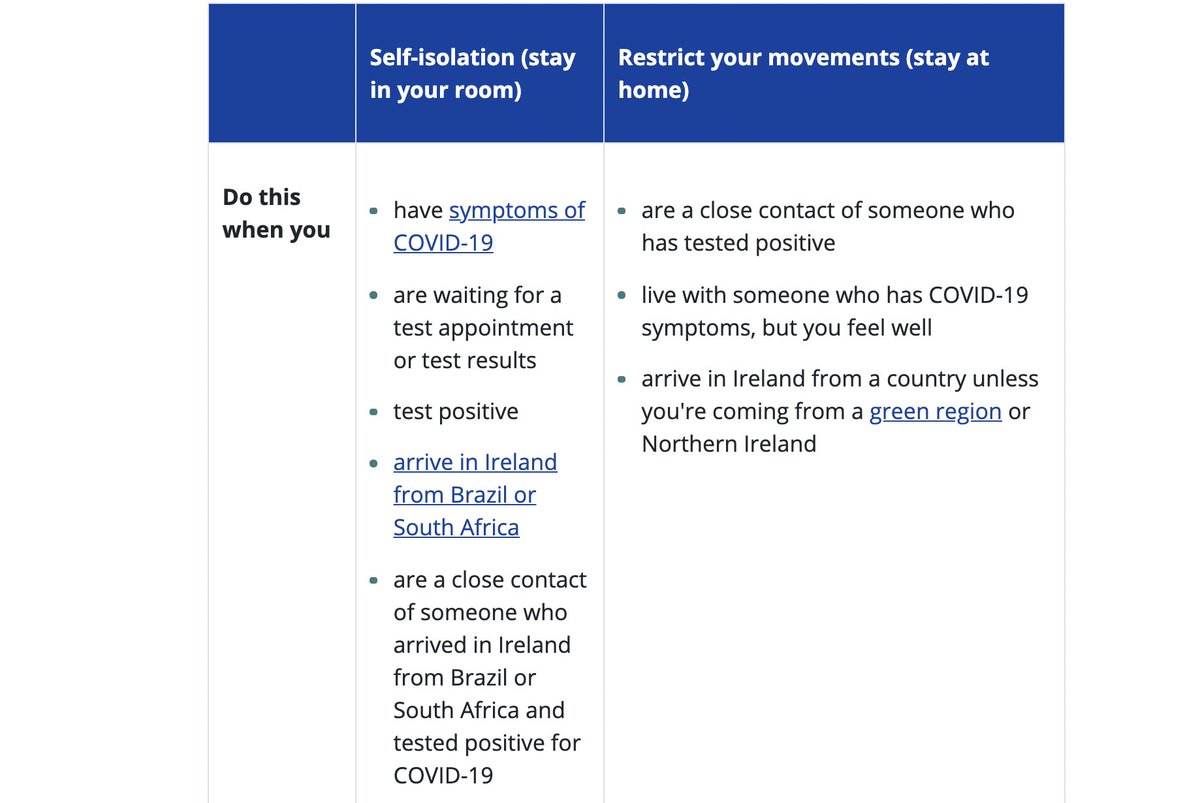Thread on something really important.
At the outset of the pandemic, @DrMikeRyan called on us to "break the chains of transmission".
We haven't. The chains now number over 100,000,000 people.
Why? A central measure is often overlooked: isolating those exposed to the virus.
At the outset of the pandemic, @DrMikeRyan called on us to "break the chains of transmission".
We haven't. The chains now number over 100,000,000 people.
Why? A central measure is often overlooked: isolating those exposed to the virus.
The above graph by @Paul5cott compares policy measures around the world on isolation and quarantine.
A lot of focus has been on reducing the random seeding of new chains of transmission through travel.
That's important - but only one part of containing Covid-19 spread.
A lot of focus has been on reducing the random seeding of new chains of transmission through travel.
That's important - but only one part of containing Covid-19 spread.
It sounds simple: if everyone who currently has the virus right now could be kept separate from other people for about two weeks, infections would drop to zero. Pandemic over.
But individuals cannot achieve it alone. Isolation only works within a system of support and enforcement
But individuals cannot achieve it alone. Isolation only works within a system of support and enforcement
Survey data shows that a very low percentage of people who are just 'told' to self-isolate actually do it.
A study of 32,000 people in the UK over three months last year found only 18% of them actually kept away from others. In the Netherlands, data indicates it's about 44%.
A study of 32,000 people in the UK over three months last year found only 18% of them actually kept away from others. In the Netherlands, data indicates it's about 44%.
A large proportion of those who ventured out despite being warned they had been exposed to Covid-19 did so to go to work.
Others have to buy groceries, or medicines, or need something for their child.
It's not just people being dicks -- they need support.
Others have to buy groceries, or medicines, or need something for their child.
It's not just people being dicks -- they need support.
In order to stop chains of transmission, countries around the world have brought in a range of supports and enforcement for self-quarantine -- illustrated by @Paul5cott with data collected by @Patel_Jay_ of @GlobalHealthGP
Meal deliveries, daily check-ups, sick pay, enforcement.
Meal deliveries, daily check-ups, sick pay, enforcement.
Isolation, including of travellers, can be done at home. But only if the person is kept totally apart from other household members.
If not, then they need to be provided with somewhere like a hotel room to be alone, as in New York, Norway, Denmark, Singapore, Japan, many others.
If not, then they need to be provided with somewhere like a hotel room to be alone, as in New York, Norway, Denmark, Singapore, Japan, many others.
(Ireland is strange here. The HSE sanctions mixing with other household members for people who have been exposed to Covid-19 -- a leaky isolation policy).
Here's what happens in Australia:
Anyone exposed to Covid-19 is handed a legally-binding quarantine order with instructions on what they can and can't do.
It lays out steep fines for breaking quarantine. The order alone is enough for vast majority to comply, says @NICU_doc_salone
Anyone exposed to Covid-19 is handed a legally-binding quarantine order with instructions on what they can and can't do.
It lays out steep fines for breaking quarantine. The order alone is enough for vast majority to comply, says @NICU_doc_salone
People quarantining are then smothered with support.
"We call them usually every day, we can arrange groceries. If they need to see a GP for something different we can help them with that, if they are alcoholics we can find them support," @NICU_doc_salone told me.
"We call them usually every day, we can arrange groceries. If they need to see a GP for something different we can help them with that, if they are alcoholics we can find them support," @NICU_doc_salone told me.
Some places like South Korea use geo-tracking apps. In New York, teams of neighbourhood helpers knock door-to-door, arranging anything that the person in quarantine needs. In Taiwan, they'll organise garbage collection for you.
East Asian countries had the advantage in rolling out these systems of past epidemic experience and strong decentralised public health systems.
But examples in the US show how much can be done if we choose to adjust, like New York's hotel quarantines and neighbourhood health hubs
But examples in the US show how much can be done if we choose to adjust, like New York's hotel quarantines and neighbourhood health hubs
Here's an incredible figure: in the US, 27% of employees do not have paid sick leave.
This study found that the introduction of two weeks' emergency sick pay due to the pandemic saw a drop of 400 Covid-19 cases -- per day, per state! https://www.healthaffairs.org/doi/pdf/10.1377/hlthaff.2020.00863
This study found that the introduction of two weeks' emergency sick pay due to the pandemic saw a drop of 400 Covid-19 cases -- per day, per state! https://www.healthaffairs.org/doi/pdf/10.1377/hlthaff.2020.00863
Advantage of keeping cases low is that you can surround those people exposed to the virus with every possible support. As cases grow exponentially, becomes exponentially harder to do.
Then, in lieu of targeted confinement, we end up with confinement of all https://www.irishtimes.com/news/health/covid-19-failure-to-self-isolate-central-to-ireland-s-coronavirus-control-problem-1.4471226
Then, in lieu of targeted confinement, we end up with confinement of all https://www.irishtimes.com/news/health/covid-19-failure-to-self-isolate-central-to-ireland-s-coronavirus-control-problem-1.4471226

 Read on Twitter
Read on Twitter




